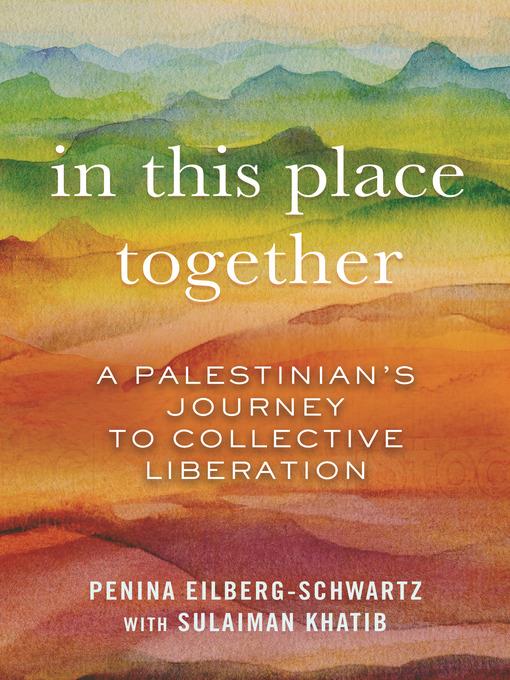
In This Place Together
A Palestinian's Journey to Collective Liberation
- اطلاعات
- نقد و بررسی
- دیدگاه کاربران
نقد و بررسی

February 26, 2021
Khatib, a Palestinian peace activist, asked American writer Eilberg-Schwartz to help chronicle his journey--from growing up in Hizma, a town not far from the Israeli border, to his present-day life in Ramallah. What unfolds is a story, both sad and hopeful, of living among people historically believed to be the enemy. Instead, Khatib develops a sense of hope and a firm belief in the power of humanity. Khatib acknowledges the ongoing conflict between Israel and Palestine, and expresses his hopes and dreams. Stories of others who live along the border show the daily realities of life in both worlds, and how the land itself has long been disputed. Khatib also looks for possibilities of peace and understanding among people with shared goals and visions for a better future. He admits he has no answers, but believes telling his story might help foster healing and perhaps lay the foundation for new peace initiatives. VERDICT A poignant, beautifully told story of a young man wanting to help create a bridge between Palestinians and Israelis. Best suited for those interested in Jewish and Middle East studies and contemporary social history.--Jacqueline Parascandola, Univ. of Pennsylvania, PA
Copyright 2021 Library Journal, LLC Used with permission.

March 1, 2021
The moving story of a Palestinian ex-prisoner who started a joint peace initiative with Israelis. Written by Eilberg-Schwartz, an American Jew, at Khatib's request, the story is a truly revolutionary attempt to set a path toward some kind of peace in the region. Growing up in Hizma, just northeast of Jerusalem's old city, Khatib spent his childhood mired in the violence and hatred between the two groups cohabiting the same land. When he was 14, he and a friend attacked two Israeli soldiers with knives. He was arrested and imprisoned for more than a decade. He used the time to learn Hebrew and read, and as a more mature man, he recognized that there was no future for either side if they continued to fight each other. When he emerged from jail, the second intifada was gaining momentum as the Oslo Accords deteriorated. Consequently, violence erupted again, absorbing much of Khatib's family and friends. Khatib refused to involve himself, however, instead learning about and speaking to Israelis, much to the shame of his family. In 2006, he co-founded Combatants for Peace with a group of Palestinian ex-prisoners and Israeli army members who refused to serve in the West Bank and Gaza Strip. The purpose of the organization was to encourage meaningful dialogue among people who rarely interacted--and often acted poorly based on a lack of factual information about their supposed enemies. Everyone involved had been deeply affected by occupation and violence, and all were transformed by the experience of "a shared feeling, an enormous hope." Khatib continues to travel widely and spread his message of peace, forgiveness, and reconciliation. Immersing herself for years in Khatib's life, Eilberg-Schwartz constructs a lyrical, beautifully written account of his remarkable journey, which should serve as a beacon of inspiration amid the continued violence. An engaging, hopeful lesson in how changing the conversation can actually change history.
COPYRIGHT(2021) Kirkus Reviews, ALL RIGHTS RESERVED.

March 15, 2021
At 14, Palestinian Sulaiman Khatib was arrested. He then served 10 years for stabbing two Israeli soldiers. Eight years after his release, he cofounded Combatants for Peace, an organization of former Palestinian and Israeli fighters dedicated to a nonviolent end of the occupation of Palestine. His friend Penina Ellberg-Schwartz, a Jewish American, anti-occupation activist, tells Khatib's story in a work of radiant contradiction and persistent discomfort. Khatib recounts his righteous teen anger, brutal imprisonment, and growing enlightenment gleaned by studying Jewish history and the great nonviolent activists King, Gandhi, and Mandela. His key insight, that "Recognizing the Jewish connection [to the land] doesn't delegitimize our claim and it's true the other way around," is transformative but begins to ring hollow as he discovers that many are eager to embrace one half of his epiphany but not the other. After participating in too many peace conferences "where Westerners wore suits and explained nonviolence to Palestinians, '' Khatib, though a believer in the power of storytelling, finds himself unable to trust in "a story that didn't ask anyone to give anything up."
COPYRIGHT(2021) Booklist, ALL RIGHTS RESERVED.




دیدگاه کاربران